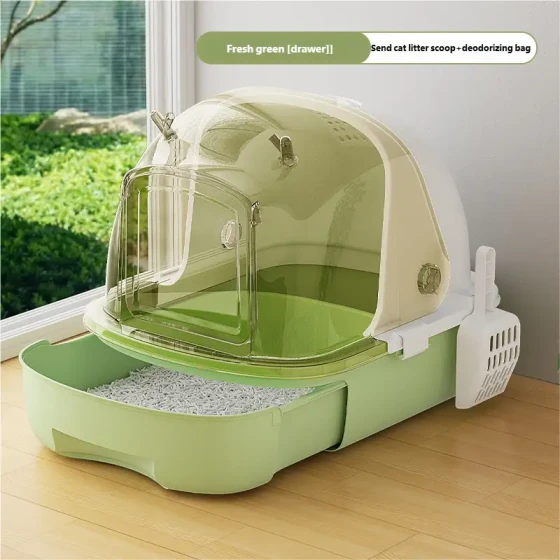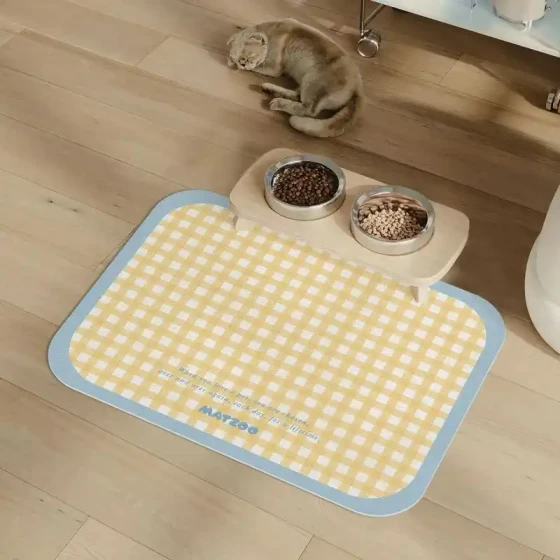How to Judge if Cats Have Worms Inside_Complete Checklist of Cat Worm Symptoms
Judging whether a cat has internal parasites cannot rely on just one or two symptoms; a comprehensive observation of the cat's physical condition, behavior, and most importantly — feces — is needed. If persistent digestive issues, abnormal weight, lethargy appear, or worms/segments are seen in the feces, one should be highly alert and promptly take the cat for a professional fecal examination to confirm.
Cats, as members of our families, may hide some uninvited guests inside their small bodies — internal parasites. These invisible threats sometimes act like undercover “agents,” silently eroding their health, and sometimes send us distress signals through obvious “codes.” As a cat owner, honing sharp eyes to decode these signals is crucial.

Many people might think that judging if a cat has internal parasites depends on whether it vomits worms or passes worms in stools. This is indeed a very direct piece of evidence, but often this means the parasite infection is already severe. In earlier or mild infection stages, symptoms can be very subtle and easily mistaken for other minor issues.
1. "Secrets" in the Stool: The Most Direct Clue
Observing the cat’s feces is one of the most important and direct ways to judge internal parasites. Normal cat feces should be formed, brown strips, moderately moist, neither too hard nor too loose. When parasites are inside, feces may have the following abnormalities:
- Changes in shape and texture: Feces become loose, unformed, or even watery diarrhea. Persistent soft stools or diarrhea may indicate various intestinal problems, including parasite infections. Sometimes mucous or even blood streaks may appear in the feces, suggesting intestinal damage or inflammation. Some parasites such as hookworms and trichomonads can cause bloody or mucous stools.
- Appearance of foreign objects: This is the most “shocking” signal. You might see live or dead worms in the feces. For example, roundworms look like cooked spaghetti, slender and white or pale yellow. Tapeworms resemble rice grain-sized, white moving segments, which may stick to the fur around the cat’s anus and become hard and yellowish when dried. According to Royal Pet Food data, seeing worms or worm segments in the cat’s feces or around the anus is a symptom of worm infection.
- Abnormal odor: Although cat feces usually have a smell, parasite-induced diarrhea may cause an abnormal foul odor.
2. "Changes" in Physical Condition: Signs of Nutrient Robbery
Internal parasites compete for the cat’s nutrients and long-term infection affects their overall health.
- Weight loss or slow gain: Especially in kittens, if appetite is normal or even increased but weight does not grow, or adult cats lose weight without dietary changes, parasite presence should be suspected. Parasites, especially roundworms, can form balls inside kittens affecting nutrient absorption, causing abdominal swelling and a thin body.
- Abnormal appetite: Some cats reduce appetite and become lethargic after infection; others may be hungry due to parasites stealing nutrients, eating a lot but remaining thin.
- Dull and lackluster coat: Parasite effects on nutrient absorption reflect on fur. A healthy cat’s coat is usually smooth and shiny; infected cats may have dry, rough, and dull coats, even prone to shedding. Royal Pet Food also mentions dry or coarse coat as a symptom of worm infection in cats.
3. "Strange" Behavior: External Signs of Discomfort
Parasite discomfort may cause abnormal cat behaviors.
- Rubbing the rear (elevating the rear and dragging on the ground): If your cat suddenly starts arching like a “horseback,” rubbing its rear on the ground, besides anal gland issues, it’s very likely segments of tapeworms being discharged causing unbearable anal itching. This is a very typical sign.
- Frequent licking or scratching of the anal area: For the same itch reason, cats may frequently lick or scratch their anal region.
- Lethargy and sleepiness: Parasite infections drain a cat’s energy, making them sleepier and less active than usual, with little interest in playing. According to search results, lethargy is one sign of worm infections in cats.
4. Abnormal "Appearance" of the Abdomen: Especially in Kittens
Kittens, with immature immune systems, are more prone to parasite infection, especially roundworms. Large infestations cause the typical “big belly” look: a round bloated abdomen but otherwise thin body. This is because worms occupy abdominal space and affect normal digestion and absorption. However, note that a big belly in kittens can also be caused by overeating, indigestion, or other diseases (such as feline infectious peritonitis), so judgment should consider other symptoms.
What to do when the "codes" appear?
Relying solely on these symptoms to judge if cats have internal parasites is not rigorous, as many symptoms can be caused by other illnesses, such as indigestion, food allergies, enteritis, or even more serious infections.
The most reliable diagnostic method is to take the cat to a veterinary hospital for a fecal examination. Veterinarians will examine fecal samples under a microscope to look for parasite eggs or worm segments. Even if no worms are seen with the naked eye, fecal tests can detect tiny eggs and determine infection type. Some parasites, such as Giardia and coccidia, are single-celled protozoa invisible to the naked eye and must be found by fecal tests. Certain special parasites, like heartworms (mainly transmitted by mosquitoes and parasitic in the cardiovascular system), require blood tests for diagnosis.
Prevention is better than cure
Waiting for symptoms to appear before deworming often causes unnecessary suffering for cats and may bring long-term health impacts. As experts suggest, regular deworming is crucial for cat health. Even indoor cats may encounter parasites through eggs brought in on owners’ shoes, clothes, mosquitoes (heartworms), or by accidentally ingesting flies or mice carrying worm eggs.
Deworming frequency depends on the cat’s lifestyle, age, and the type of deworming drugs used. Generally, kittens require more frequent deworming. Adult cats, even if not going outdoors, are recommended to deworm regularly. It’s best to consult a vet to create a personalized deworming schedule.
Final words
Cats cannot speak; their carriers of health information are their body changes and behaviors. As responsible owners, we need to maintain meticulous observation and not miss any possible “codes.” Remember, early detection and intervention not only reduce suffering but also help cats live healthier and happier lives with us. If you have any doubts about your cat’s condition, be sure to seek professional veterinary help. They are the best “detectives” guarding your cat’s health.



